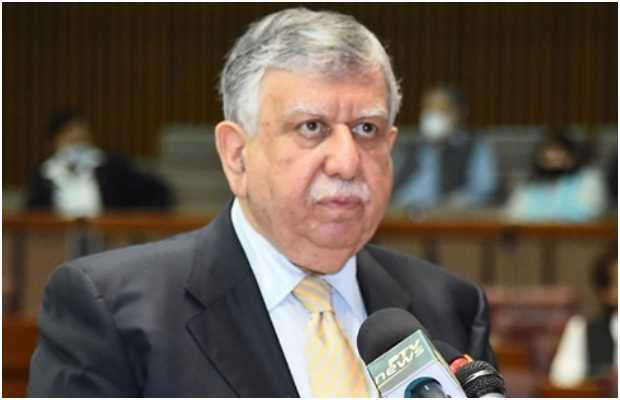Budget for FY2021-22: Govt. announces major tax relief for different sectors, sets the GDP growth rate at 4.8%

Finance Minister Shaukat Tarin presented an Rs8,400 billion budget for the fiscal year 2021-2022 in the National Assembly on Friday.
In his budget speech, Tarin said that he”The country was on the verge of bankruptcy when we assumed the power and the current account deficit was US$20.”
He said that the government faced the biggest challenge of saving the country from bankruptcy.
“We adopted the policy of reducing the expenditures and increasing the income,” he maintained.
Shaukat Tarin said that the government faced two waves of coronavirus.
“During the coronavirus pandemic, 12 million families were provided financial assistance,” he added.
He claimed that the per capita increased by 15 percent despite the coronavirus pandemic.
“We have overcome the current account deficit. A record increase of 25% has been made in remittances. We face the challenge of inflation,” he declared.
The minister added that the exports witnessed a 14 percent increase.
Key announcements of budget FY2021-22:
- Pakistan reduces sales tax on locally manufactured electric cars to only 1%. Previously, it was 17%.
- Pakistan reduces sales tax on locally manufactured cars from 17% to 12.5%.
- No federal excise duty on 850cc locally produced cars.
- Action to be taken against those harassing taxpayers. Government to use tax machinery against those not paying taxes and those not filing them.
- No new tax on salaried people.
- FBR to form special retail cells to facilitate people.
- No import taxes on books and magazines.
- Special technology zones will be formed in the country. Plants, machinery, and other equipment will be tax-free in these zones.
- The government has reduced the Capital Gain Tax from 15% to 12.5%.
- Sales tax on locally made electric cars has been reduced to 1% from 17%.
- Withholding tax reduced by 40%. There will be no withholding taxes on banking transactions, margin financing, air travel services, debit card and credit transactions, and discovery of minerals.
- Withholding tax on mobile phones will be reduced by 10%, and then to 8%.
- No tax on certain locally made heavy motorcycles.
- No Customs duty on animal vaccines.
- To facilitate the tourism sector, there will be either 0% Customs duty or discount on raw material being used in the sector.
- Salaries of the government employees to increase by 10%.
- Pension to increase by 10%.
- For Grade 1 to 5 officers, integrated allowance to increase from Rs450 to Rs900.
- The minimum wage to be Rs20,000.
The government allocated the following amount for different programmes:
- Rs260 billion for the Ehsaas programme.
- Rs900 billion for public sector development programmes, which has been increased by 40%. The amount will be spent on water distribution, road infrastructure, special economic zones, combatting climate change, among others.
- Rs12billion for agriculture.
- Rs23 billion for Diamer and Bhasha dams.
- Rs14 billion for Neelum-Jhelum hydro-power plant.
- Rs244 billion for Gwadar airport and highway.
- Rs25 billion for small dams in Sindh.
- Rs118 billion for energy and power projects.
- Rs22 billion for Jamshoro coal power plant.
- Rs16 billion for KI, KII projects in Karachi, and Tarbela power plant.
- Rs100billion for special development packages for the development of poorer cities.
- Rs54 billion for the development of KP’s merged districts.
- Rs14 billion for tree plantation programmes and combatting climate change.
- Rs739 billion for Karachi transformation plan.
- Rs100 billion for covid-19 emergency fund.
- Rs1.1 billion for the procurement of coronavirus vaccines. The government aims to vaccinate 100 million people by June 2022.
- Rs12 billion for SME support programmes.
- Rs10b for Kamyab Naujawan programme.
- Rs66 billion for HEC and education programmes.
- Rs60 billion for Azad Jammu and Kashmir, which was previously Rs56 billion.
- Rs47 billion for Gilgit-Baltistan, which was Rs32 billion before.




